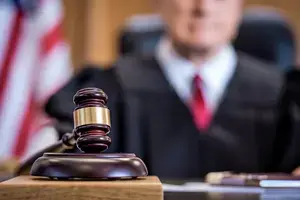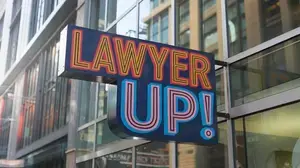FAQs About Domestic Violence Protective Orders (DVPOs) in Mecklenburg County
 Domestic Violence Protective Orders (DVPOs) regularly play a critical role in Mecklenburg County, North Carolina DV and family law issues. While designed to protect alleged victims from harm within certain types of personal relationships, entry of a 50B can also have significant legal consequences for wrongly accused.
Domestic Violence Protective Orders (DVPOs) regularly play a critical role in Mecklenburg County, North Carolina DV and family law issues. While designed to protect alleged victims from harm within certain types of personal relationships, entry of a 50B can also have significant legal consequences for wrongly accused.
DV orders are a type of restraining order. Big picture, they can preclude normal activities, “restraining” the defendant from doing certain thinks like seeing children, going to different places, or even contacting or texting a loved one. Sometimes that order is temporary in nature and, as such, it’s not that unusual to hear clients refer to them as a TRO - Temporary Restraining Order.
With regard to domestic violence legal issues, those types of restraining orders are largely governed by Chapter 50B of the North Carolina General Statutes. That statute, which is another way of saying “the law,” is broadly written and inclusive in nature. The NC DVPO provisions and possible “remedies” are intended to address a wide range of situations involving current or former spouses, cohabitants, co-parents, and even those in dating relationships.
"Clearly, the domestic violence law, as it pertains to 50B civil actions, is not solely limited to people who live together. It’s a complicated, messy area of law. In part that’s because of the subject matter of the litigation, which can be rife with emotion."
- Bill Powers, Domestic Violence Lawyer in Mecklenburg County
The process of obtaining or responding to a DVPO in Mecklenburg County also involves navigating a relatively complex legal system, particularly given that Charlotte's courts are among the busiest in North Carolina.
A domestic violence protection order can significantly impact various aspects of daily life, including living arrangements, personal interactions, and family dynamics. Understanding the nuances of these legal processes is an important first step, as each case presents unique circumstances with potentially long-lasting effects on families and the individuals involved.
This guide provides helpful information about DVPOs in Mecklenburg County, offering insights into the various purpose, process, and potential consequences of allegations of domestic violence holistically. It also addresses some of the realities of how the respective local rules, polices, and preferred protocols for 50B Orders in Mecklenburg are applied in real life, day-to-day scenarios.
Big Picture: Domestic Violence in Mecklenburg CountyWhile the law is the same throughout North Carolina, it would be a tremendous mistake to ignore the realities of the system. Charlotte-Mecklenburg, the 26th Judicial District, is a big jurisdiction.
It’s large geographic footprint includes more than just uptown Charlotte. There remains a fair amount of the “small town” North Carolina in Matthews and Pineville, and Mint Hill, Cornelius, and Huntersville.
It’s a diverse judicial district with lots of different peoples from different ethnic, cultural, and socioeconomic backgrounds. As of 2020, the last US Census data indicates some 1,115,482 people live in Mecklenburg. Anyone living in the area knows that number has exploded, with Charlotte being considered “one of the fastest growing cities” in the country.
It’s also one of the most overwhelmed judicial districts in North Carolina. Those are all relevant factors to be aware of and consider if you have a domestic violence matter in the Queen City and Mecklenburg County. The numbers a disturbing.
Here are some key statistics that demonstrate how busy the domestic violence system is in Mecklenburg County and why retaining legal counsel is a good idea if your accused of DV:
- Volume of Domestic Violence Protective Orders (DVPOs):
- Over 15,000 DVPOs were filed between January 2018 and June 2022.
- In 2021 alone, there were 4,005 DVPO filings.
- The Mecklenburg County Sheriff's Office served 3,403 DVPOs in 2021.
- Criminal Incidents:
- In 2021, the Charlotte-Mecklenburg Police Department alone reported 5,564 criminal incidents flagged as domestic violence-related.
- These incidents included serious charges like aggravated assault (1,103 cases), assault on a female (1,294 cases), and incidents involving firearms (362 cases).
- Lethality Assessments:
- Between 2019 and 2022, over 14,000 lethality assessment screens were conducted by first responders.
- More than 50% of these screens indicated high lethality risk.
- In 2022, 63.38% of assessments screened as "high-risk."
- Court and Legal Services Demand:
- Between July 2018 and June 2022, Safe Alliance provided court accompaniment and/or civil legal services for 9,800 clients.
- This included nearly 18,500 instances of court accompaniment and more than 4,500 services to assist victims with domestic violence protective orders.
These statistics show an extremely high volume of cases moving through the system, from initial police contact to court proceedings. The large number of DVPOs, criminal incidents, and high-risk assessments indicates that accusations of domestic violence are taken very seriously in Mecklenburg County.
Given this high-volume, high-stakes environment, retaining legal counsel if accused of domestic violence makes sense. An experienced attorney can navigate the complex legal system, explain your rights and options, and advocates for your best interests in a system that processes thousands of cases each year.
Indeed, we believe it’s smart to retain legal counsel who is experienced with both the civil and potential criminal aspects of allegations of domestic violence. Please TEXT or call the attorneys at Powers Law Firm now to determine the firm’s availability to help: 704-342-4357
A Domestic Violence Protective Order, commonly referred to as a DVPO or 50B order in North Carolina, is a civil court order designed to protect victims from future acts of domestic violence. Such protection orders fall under the jurisdiction of Chapter 50B of the North Carolina General Statutes and can have significant legal implications for both the person seeking protection and the person against whom the order is filed.
DVPOs are applicable in various relational contexts, including current or former spouses, individuals who live together or have lived together, people who share a child, or those in current or former dating relationships. The law is intentionally broad to recognize different forms of domestic violence, encompassing physical abuse, threats of bodily injury, stalking, and harassment that causes substantial emotional distress.
When a court grants a DVPO, it can require the defendant to stay away from the protected party's home, workplace, and school. The order may also prohibit any form of contact, including phone calls, text messages, or communication through third parties. In some cases, a DVPO can affect living arrangements, potentially requiring the defendant to leave a shared residence. The order may also address temporary child custody and visitation arrangements if children are involved.
It's important to understand that while a DVPO is a civil order, violating its terms can result in criminal charges. This means that even if the defendant believes the allegations are false, failure to comply with a DVPO can lead to serious legal consequences, including potential arrest and criminal prosecution.
 In Mecklenburg County, the process for DVPO hearings involves several steps and can take place in different courtrooms depending on the specific circumstances of the case.
In Mecklenburg County, the process for DVPO hearings involves several steps and can take place in different courtrooms depending on the specific circumstances of the case.
Initially, when someone seeks a DVPO, they can file a complaint (a type of lawsuit/legal pleading) with the Clerk of Court. If the situation is deemed urgent, a judge may issue a temporary or "ex parte" order without the presence of the accused party. This temporary order typically remains in effect until a full hearing can be scheduled, usually within 10 days. The defendant must be served with the complaint and motion for a Domestic Violence Protection Order and provided a court date for further proceedings.
Many DVPO cases in Mecklenburg County have hearings conducted on the fourth floor of the Mecklenburg County Courthouse, specifically in Courtroom 4110. This courtroom is designated for domestic violence matters, allowing for focused attention on these sensitive cases. It is a "Court of Record," meaning the proceedings are recorded and available for transcription for future hearings, trials, and additional proceedings.
During the hearing, both parties have the opportunity to present their case. The person seeking the DVPO (the plaintiff) must prove their case by a "preponderance of the evidence," meaning it's more likely than not that the alleged domestic violence occurred. The accused party (the defendant) has the right to contest the allegations and present their own evidence.
It's worth noting that in some instances, DVPO matters may be addressed in Family Court, particularly when they are intertwined with other family law issues such as separation, divorce, child custody, or support. In these cases, the hearings might occur in a different courtroom, typically on the 6th or 8th Floor "Family Court" courtrooms in Mecklenburg County, and may be part of a broader family law proceeding under Chapter 50-13.1.
The judge presiding over the hearing has the authority to grant or deny the DVPO based on the evidence presented. If granted, the order of protection can last up to one year and may include provisions regarding no-contact restrictions, living arrangements, temporary custody, support, and possession of weapons by the defendant.
Domestic Violence Protective Orders can indeed have a significant impact on child custody, visitation, and support arrangements. When a court issues a DVPO in cases involving families with children, the order may include provisions that directly address these matters.
Regarding child custody, a DVPO can grant temporary custody to the protected party. This arrangement is typically intended to last until the matter can be more fully addressed in Family Court, consistent with N.C.G.S. Chapter 50 Child Custody and Child Support legal issues. It's important to understand that this custody determination is temporary and does not automatically become a permanent arrangement. However, it can influence future custody decisions if the matter proceeds to a full custody hearing and “findings of fact” are made regarding one or more “acts of domestic violence” relevant to the best interests of the child or children.
Visitation rights can also be affected by a DVPO. In cases involving children, a judge issuing a 50B order has broad discretion in determining appropriate visitation arrangements. These can vary widely based on the specific circumstances of the case. While in some instances, visitation might be supervised, limited, or even prohibited entirely, in other cases, the DVPO may allow for continued regular contact between the children and both parents.
The Court may implement various arrangements to facilitate safe visitation. This could include designating neutral drop-off and pick-up locations for child exchanges, specifying times and places for visitation, or arranging for a third party to oversee exchanges. In some situations, the Court might order supervised visitation, where contact occurs under the watch of a designated third party.
These measures aim to balance the safety concerns that led to the 50B order with maintaining the children's relationships with both parents when appropriate. The specific terms of visitation in a 50B order are determined on a case-by-case basis, considering the best interests of the children and the particular circumstances of the family involved.
Regarding child support, while a DVPO itself doesn't typically establish long-term support obligations, it may include temporary orders for child support. These orders help ensure that the children's financial needs are met during the period covered by the DVPO.
It's worth noting that the issuance of a DVPO does not determine guilt in any associated criminal proceedings. However, the existence of a DVPO and the allegations underlying it may be considered in subsequent family court proceedings related to custody, visitation, and support.
Violating a Domestic Violence Protective Order in North Carolina can lead to serious legal consequences. It's important to understand that each violation can be treated as a separate criminal charge such as assault, AOF - Assault on Female AWDW - Assault with Deadly Weapon, and Communicating Threats. Once a DVPO is issued and properly served, it becomes a legally binding court order.
Knowingly violating a valid DVPO is classified as a Class A1 misdemeanor in North Carolina. This offense carries potential penalties that may include a period of active incarceration of up to 150 days in jail. The exact sentence can vary based on factors such as the nature of the violation and the defendant's prior record level.
It's important to note that each separate violation of a DVPO can be charged as a distinct offense. For instance, if someone subject to a DVPO makes multiple prohibited phone calls or sends several text messages, each instance could potentially result in a separate criminal charge.
Beyond criminal penalties, violating a DVPO can have other significant consequences. It may negatively impact ongoing or future family court proceedings, potentially affecting matters like child custody and visitation rights. For a defendant who is on probation or post-release supervision, or who is subject to a "no contact Order" as a condition of bond or release from custody, a violation could lead to revocation of their supervised release or bond.
Additionally, a conviction for violating a DVPO becomes part of a defendant's criminal record, which can have long-lasting effects on employment opportunities, housing applications, and other aspects of life.
It's also important to note that in North Carolina, law enforcement officers are directed to arrest a suspect if they have probable cause to believe a protective order has been violated. This means that even when the protected party (the alleged victim) initiates contact or invites the restrained defendant to meet or voluntarily reestablish a relationship, complying with that request could still result in arrest if reported.
Given these potential consequences, it's extremely important to strictly adhere to the terms of any DVPO, even if you disagree with its issuance. If you believe the order is unjust or if circumstances have changed, the appropriate course of action is to seek modification or termination of the order through legal channels, rather than violating its terms. Put simply, Lawyer Up.
Understanding Your Rights and Options with DVPOs in Mecklenburg County
 Navigating the complex landscape of Domestic Violence Protective Orders in Mecklenburg County deserves a nuanced understanding of both civil and criminal law. Whether you're seeking protection or responding to allegations, the implications of these legal proceedings can be far-reaching, affecting various aspects of life, from family relationships to employment opportunities.
Navigating the complex landscape of Domestic Violence Protective Orders in Mecklenburg County deserves a nuanced understanding of both civil and criminal law. Whether you're seeking protection or responding to allegations, the implications of these legal proceedings can be far-reaching, affecting various aspects of life, from family relationships to employment opportunities.
It's important to remember that each case is unique, with its own set of circumstances and individual challenges. What may be the right approach in one situation might not be appropriate in another. This underscores the value of seeking personalized legal guidance tailored to your specific situation.
For anyone facing allegations that could lead to a DVPO, understanding the interplay between civil proceedings and potential criminal charges is an important first step. The statements made and evidence presented in DVPO hearings can have a significant impact beyond the immediate civil matter. Balancing the need to defend against allegations in a DVPO hearing with protecting rights in potential criminal proceedings requires careful consideration and strategy.
Similarly, for those seeking protection through a DVPO, understanding the legal process and the types of relief available can help ensure that your questions are addressed. Knowing how to properly document and present evidence of abuse or threats can strengthen your case and increase the likelihood of obtaining the protection you need.
It's also worth noting that while the legal system can seem intimidating, it's designed to protect the rights of all parties involved. Whether you're seeking protection or defending against allegations, you have the right to have your voice heard and your side of the story considered.
As you move forward, consider the long-term implications of actions and decisions. The outcomes of DVPO proceedings can affect future family law matters, employment opportunities, and other aspects of life.
"Taking a thoughtful, informed approach now can help protect your interests both in the immediate future and in the long term."
- Bill Powers, Domestic Violence Lawyer
If you're dealing with DVPO issues in Mecklenburg County, remember that you don't have to navigate this complex legal terrain alone. Experienced attorneys can provide valuable guidance in handling both the civil aspects of DVPOs and related criminal charges. A holistic approach can address the different aspects of your legal situation, helping you make informed decisions that protect your rights and best interests.
Understanding your rights and options is an important first step toward effectively addressing DVPO matters and moving forward with your life. Whether you're seeking protection or responding to allegations, being well-informed can make a significant difference in the outcome of your case.
Helpful Information About Criminal Charges Powers Law Firm PA Home
Powers Law Firm PA Home


















